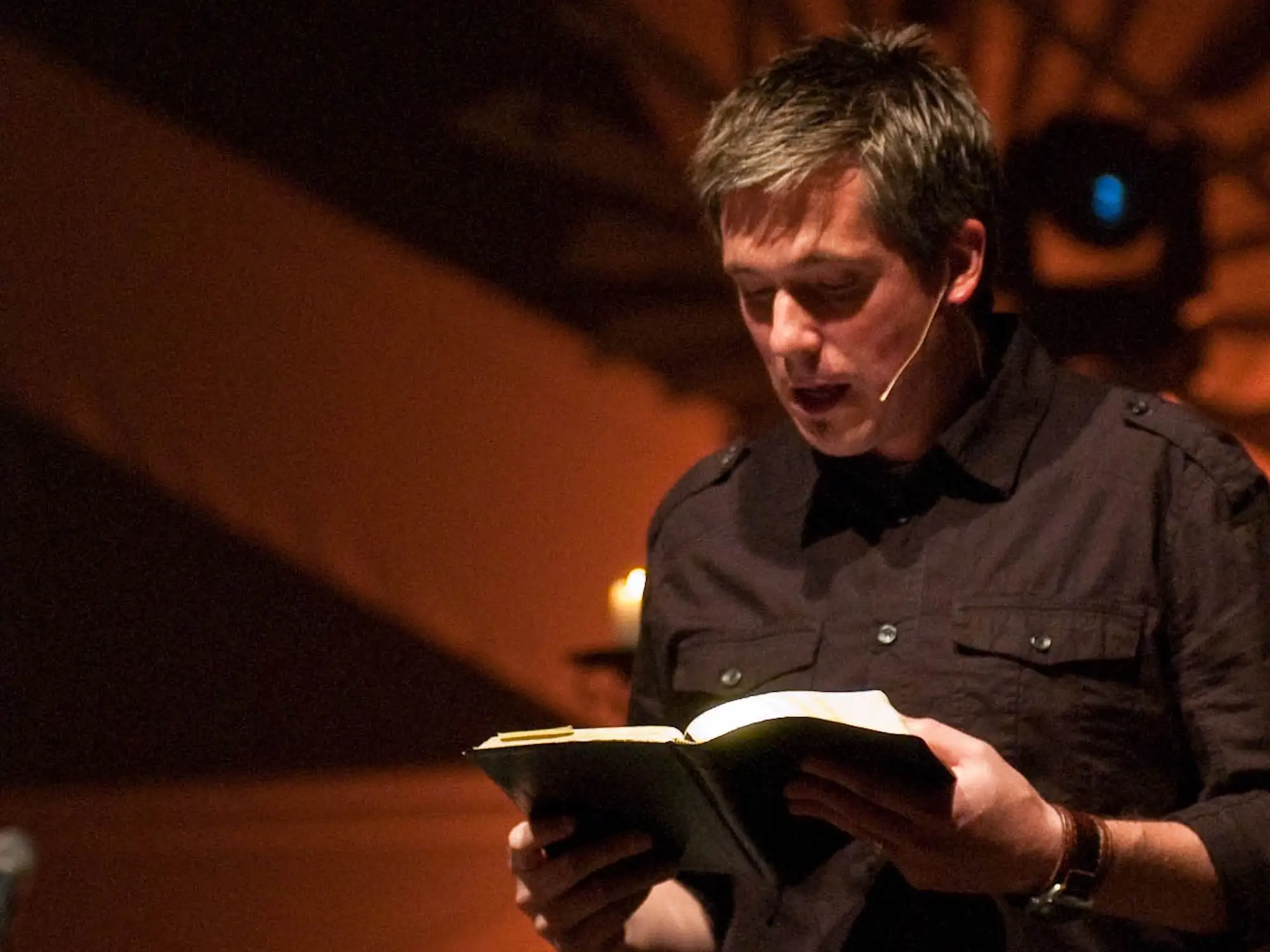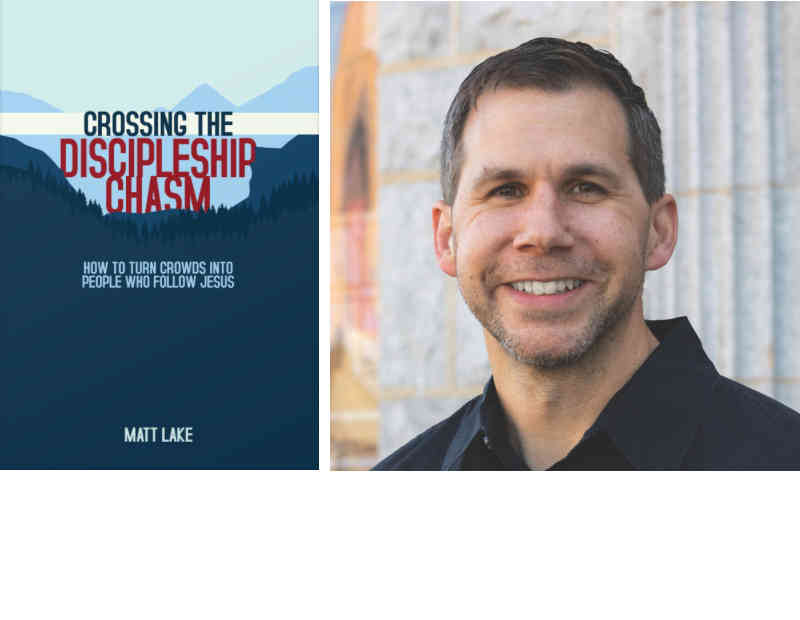Jesus called people to believe in him, but his ultimate call was for us to be disciples and to make disciples (Matthew 28:18).
A disciple isn’t just a believer, but someone who follows. Follows where Jesus goes and follows his teachings as best they can.
So are today’s churches making active disciples, or merely passive consumers?
These are the questions raised by this new book by US pastor Matt Lake, Crossing the Discipleship Chasm.
“Crossing the Discipleship Chasm”
The book is barely 100 pages long and contains just 3 chapters. It’s a quick read and contains some useful ideas that would benefit most churches. Each chapter ends with a series of questions readers can use to help analyse their own situation.
Challenges facing the church
Active or passive?
It is an oft-quoted claim that in most churches, 20% of the people do 80% of the work. The other 80% tend to be fairly passive, turning up on Sunday, contributing funds, but contributing little to any of the ministries and programs of the church beyond consuming.
It seems that the rising cost of living and increased busy-ness is taking away many people’s time to serve, so we can’t know how much time each person has these days. Anyway, being a disciple is more than simply being a church volunteer – many people may serve the kingdom of God outside the church.
Nevertheless, it seems that most churches have a discipleship problem.
And then there was Covid
Matt Lake reports that large numbers of people (anywhere from 30% to 70%) didn’t return to church after the Covid restrictions ended. This may be another indication that they weren’t strong disciples.
Politics divides
Matt also reports that issues like wearing masks during Covid, vaccinations and Donald Trump have greated major divisions in the US church, with many pastors worried that they’ll lose half their congregation no matter what approach they take on these issues.
A “wicked” problem
He argues that discipleship is now a “wicked” problem, meaning that it has no simple solution. He says it isn’t enough to simply do Biblical teaching and rely on the congregation applying the teaching and acting on it.
Instead, he says, churches need a pathway to engagement for their members.
Four tensions
He sees four issues where churches may be tempted to focus on one side or other of the tensions:
Belief vs behaviour. Imparting knowledge via scriptural teaching or growing by putting faith into practice?
Gathered vs sent. Is our goal to encourage believers to gather to build each other up, or to be sent out to serve?
Formal vs informal. Should churches run formal discipleship classes and courses, or train and mentor people in informal relationships?
Deep vs new. Should the church focus on helping members deepen their faith via BIble study and theology, or focus on learning new things by getting out and making new disciples?

It seems obvious that in each case, churches should do both. His way of expressing it is to keep the two opposites in tension adaptively – that is, constantly checking where the balance needs to be.
It seems to me that in each case, the first or inward-looking focus is meant to be a means to the end of the second, outward-looking focus.
Barriers to getting the balance
Matt outlines seven barriers to achieving a balanced discipleship program in a church.
- Cultural upheaval: the old Christendom world where the church was an important societal institution has long gone. In a world where technology puts so much information in the palms of our hands, how can sermons and the church remain relevant?
- Irrelevant measurements: churches are judged by measures of attendance and budgets, when it should be the numbers of mature christian leaders and apprentice disciples.
- Institutional preservation: focusing on keeping the doors open rather than engaging in mission.
- Passive christian spirituality: rarely is discipleship marked by passion and excitement – too many christian seem jaded.
- Culture of instant gratification: discipleship takes time, but patience is often lacking.
- Stability focus: control and institutional thinking stifle necessary innovation.
- Retreating vs exploring: this isn’t a time to crawl into our shells.
All this analysis happens in the first chapter. The remaining two chapters outline ways forward.
Ways forward
Matt suggests several ideas:
Behaviour must match knowledge
There isn’t much point in developing a church membership that knows the Bible well but haven’t been transformed by that knowledge and don’t “walk the talk”.
Embrace the tension
It is good to focus on both sides of each tension. In particular, strive for a balance between:
- spiritual formation in the gathered community, which will be stable, established and centralised, and
- passionate reaching out to the surrounding community, which will be nimble, entrepreneurial, organic and decentralised.
Encourage & develop all 5 leadership roles
In Ephesians 4 Paul lists 5 leadership roles: apostle, prophet, evangelist, pastor & teacher. Churches tend to neglect many of these, but all are important in making and growing disciples.
Disciples are more than simply church volunteers
Matt suggests that many church discipleship programs are aimed at producing church volunteers – people who serve within the gathered community. If discipleship programs focus on information and knowledge but ignore formation and patience, they’ll produce consumers rather than disciples.
Discipleship programs
Matt envisages churches having comprehensive discipleship programs that embrace the tensions outlined above, and he gives some examples of how these might work.
Final assessment
I feel this small book touches on some very important issues. But I feel it is just the start of a journey many churches need to take.
Should you buy this book? I’m not sure. My summary here may be enough to get you started. You may also choose to check out his webinar on this topic.
But whether blog post, webinar or book, these ideas are too important not to study and apply them.

Sermons: not a good way to teach and make disciples
Communication in the church is more than speaking – we want listeners who will act on what they hear.

Making young disciples in the 2020s
Ideas on passing on faith to the next generation, based on many years of experience.

Why discussion is important
Discussion may be seen as an optional extra, but educators have found that it has a crucial and essential role in remembering, learning and acting on information.

Leave a Reply